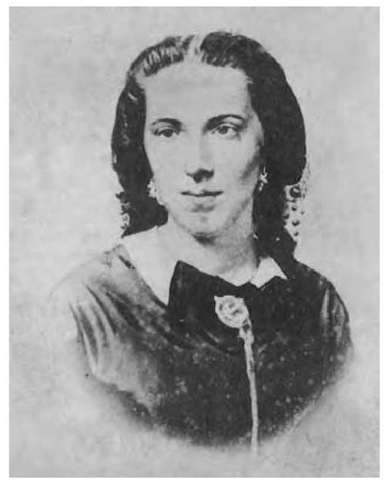(1843-1900)
Confederate spy during the American Civil War. Born to Mary Rebecca Glenn and Reed Boyd on May 9, 1843, in Martinsburg, Virginia (now West Virginia), Belle Boyd became one of the Confederacy’s most active and well-known female spies. Boyd’s success as a Civil War spy resulted in part from her ability to use her femininity to escape detection and punishment. Belle Boyd’s early support of the Confederacy came in the form of traditional female roles. She served as a nurse and raised money for the Confederacy, and she organized groups of women to visit Southern troops. Approximately a week after shooting and possibly killing a Northern soldier who broke into her house, Boyd began her career as a Confederate spy. As a spy, Boyd played on her femininity to gather information. After gleaning details from federal soldiers through flirtatious conversations, she passed information on Union troop movements and plans to Confederate officials.
Marriage of a Confederate Heroine
"On the 25 th [August, 1864], a most interesting ceremony of marriage took place at the church of St. James, Piccadilly, London. The bridegroom, Lt. Samuel Wilde Hardinge, who is about 30 years of age, was an officer in the United States navy, holding the rank of Lt. on board the American war steamer Connactacu. The lady, who is about the same age as the gallant bridegroom, was the daughter of Gen. Boyde, of the army of the Southern States, who lately expired in prison, having been made a prisoner by the Federals. The lady’s career is full of the most eventful, heroic, and romantic features. Her father, who possessed vast estates in Virginia [and] early embraced the cause of Southern independence … was soon entrusted with command, obtaining the rank of general. His daughter, the bride, enthusiastically embraced the cause, followed her father to the field and accompanied him throughout his campaign with the celebrated ‘Stonewall’ Jackson, and on two occasions, heroically, as a modern Joan of Arc led on the troops to battle. She was, however in a skirmish captured, and made prisoner, and conveyed to Washington where she was imprisoned. Here she remained 13 months, when she was exchanged for Gen. Cochrane, who had been made prisoner by the Confederates. On her return to the South, she went on board the Greyhound Confederate steamer which was captured by the Federal steamer Conn-actacu while running the blockade. Lt. Hardinge was sent on board the Greyhound as a prizemaster, with his young heroine as a prisoner. The result was that they mutually became enamoured and escaped together from the ship, and found their way to this country, the bride having succeeded in withdrawing her lover from his allegiance to the United States flag, and enlisted his sympathies and support for the South. It is the intention of Lt. Hardinge with his bride to leave this country at the latter end of Sept. to run the blockade and enter the service of the Southern States. The marriage cortege was comparatively private, being confined to the bridesmaid and two or three lady friends, the bridegroom being attended by a number of American gentlemen connected with the South. After the conclusion of the ceremony the parties repaired to the Brunswick Hotel Jermyn street, where the bridegroom has resided since his sojourn in this country, and partook of an elegant dejeuner."
Boyd most often shared information with two prominent Confederate generals, P. G. T. Beauregard and Thomas Stonewall Jackson. These two commanders used Boyd as a courier, and she repeatedly carried information, supplies, and weapons successfully across enemy lines. In the spring of 1862, after delivering information to Jackson as he launched an offensive in the Shenandoah Valley, Boyd’s part in this successful campaign was discovered. Consequently, Union forces arrested her on July 29, 1862, and held her in Washington’s Old Capitol prison for the next month. In June 1863, she was again arrested for her role as a spy and imprisoned in Washington’s Carroll Prison. After contracting typhoid, Boyd was released in December 1863 and banished to the South. Union officials hoped this was the end of her espionage career.
The arrests did not deter Boyd. In May 1864, she boarded a blockade-runner headed toward England to deliver Confederate dispatches. Before the mission could be carried out, Union forces captured Boyd’s ship and placed her under arrest. In Boston, Boyd escaped from federal custody. She fled first to Canada and then England. Union officials held Ensign Samuel Wylde Hardinge, Jr., the officer in command of the captured ship, responsible for Boyd’s escape. Hardinge followed Boyd to England where they married in August and later had a daughter. He died soon after that. From England, Boyd published her memoirs, Belle Boyd in Camp and Prison (1865) in her continuing effort to recruit support for the Confederacy.
Belle Boyd, Confederate spy during the American Civil War.
After the Civil War, Boyd pursued a stage career, with most of her performances centered on her activities as a Confederate spy. In the 1880s, Boyd lectured throughout the United States about her wartime activities, stressing the importance of national unity and reunion. Her speeches became especially popular among Union veterans. Belle Boyd died of a heart attack on June 11, 1900.

